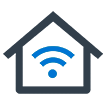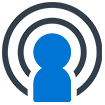Healthcare apps are revolutionizing the modern medical ecosystem by enabling the integration of advanced technologies to streamline the healthcare system. From disease diagnosis to the delivery of personalized treatments, medication management, electronic healthcare record tracking, remote patient monitoring, and more, the entire healthcare ecosystem, including hospitals, clinics, physicians, nurse practitioners, insurance companies, and other health-related organizations, benefit from mHealth apps. This streamlined healthcare process enhances collaboration and communication to provide patient-centric care outside traditional settings.
In this blog, we will discuss how healthcare providers can leverage a robust healthcare application ecosystem to digitize patient care and deliver effective medical services.
1. Streamlined Healthcare Process
Hospitals can effectively schedule appointments, automate administrative tasks, manage patient records, manage billing processes, and much more with a healthcare application ecosystem. These apps also allow doctors to access patient’s histories to detect symptoms and diagnose illnesses for early prevention of diseases. Moreover, clinical practitioners can effectively collect, analyze, and utilize patient data to collect samples and generate reports that enable doctors to analyze the patient’s condition and provide medical prescriptions and personalized treatments. The goal is to create a more efficient, error-resistant, and patient-centric healthcare application ecosystem through the seamless integration of technology into various medical workflows.
2. Telemedicine Revolution
Doctors and patients can now virtually communicate and connect without the need for in-person hospital visits using healthcare mobile apps. The transformative healthcare mobile apps leverage cutting-edge technologies to facilitate remote consultations, diagnostics, and patient monitoring, breaking down geographical barriers and expanding access to medical expertise. Through secure video calls and messaging features, patients can receive medical advice, and prescriptions, and even discuss symptoms with doctors in real time. Furthermore, healthcare mobile apps often incorporate features like appointment scheduling, medication reminders, and virtual monitoring through wearable devices. These elements streamline the entire telemedicine healthcare application ecosystem, making it more user-friendly and efficient for both patients and healthcare providers.
3. Data-Driven Medical Imaging and Scanning
Data-driven healthcare mobile apps revolutionize medical imaging and scanning by employing sophisticated algorithms and machine learning models. This healthcare application ecosystem empowers doctors to seamlessly integrate various imaging modalities, such as X-rays, MRIs, and CT scans, into a centralized platform. Through advanced image recognition, pattern analysis, and deep learning, doctors can achieve accurate and rapid interpretation of medical images, expediting the diagnostic process and enhancing precision in identifying subtle abnormalities. Leveraging vast datasets, these mHealth apps continuously improve their diagnostic capabilities, providing doctors with a powerful tool for comprehensive and efficient medical imaging.
4. Electronic Health Records (EHR) Systems
Healthcare application ecosystem streamlines electronic health records management, enhancing efficiency and patient care. These apps allow healthcare professionals to access, update, and share patient records seamlessly through mobile devices. Doctors can review medical histories, lab results, and treatment plans on-the-go, promoting quick and informed decision-making. The integration of EHR into mobile apps also facilitates secure communication among healthcare teams, ensuring coordinated and timely care. Patients benefit from improved engagement as they can access their health records, schedule appointments, and receive notifications via mobile apps. The overall result is a more agile and connected healthcare system, with mHealth apps playing a pivotal role in enhancing EHR accessibility, accuracy, and communication within the healthcare application ecosystem.
5. Chronic Disease Management
Managing chronic diseases is crucial for patients suffering from diabetes, obesity, strokes, and other chronic conditions, that need immediate attention. Healthcare mobile apps come equipped with powerful tools for monitoring, tracking, and managing chronic conditions. Patients can keep track of their health by inputting relevant health data, such as blood pressure, blood glucose levels, or physical activity, allowing for real-time monitoring and early intervention. Moreover, patients can receive medication reminders and personalized treatment plans by tracking their symptoms. Likewise, healthcare providers can remotely access this data, enabling proactive and personalized care. Through continuous monitoring, timely communication, and education, the healthcare application ecosystem contributes to improved outcomes and a more patient-centric approach to chronic disease management.
6. AI Chatbots for Virtual Assistance
AI chatbots integrated into healthcare apps serve as virtual assistants, employing artificial intelligence and natural language processing to offer personalized and accessible support for both patients and doctors. Patients benefit from AI chatbot features like appointment scheduling, medication reminders, symptom checking, personalized interaction, and timely responses from the healthcare application ecosystem. For doctors, AI chatbots streamline administrative tasks by handling appointment bookings, sending reminders, and managing routine inquiries. They can assist in collecting patient data before appointments and optimizing the time spent during consultations. Additionally, chatbots contribute to patient education by delivering relevant information and resources. These chatbots enhance the overall efficiency of healthcare delivery, providing a user-friendly and personalized virtual assistance experience that transforms how healthcare information is accessed and managed.
7. Clinical Decision Support Systems
Clinical Decision Support Systems (CDSS) integrated into healthcare apps play a pivotal role in transforming medical decision-making processes. These systems leverage advanced algorithms and data analytics to analyze vast amounts of patient data, medical literature, and best practice guidelines. By processing this information, CDSS assists healthcare professionals in making informed and evidence-based decisions, ultimately improving diagnostic accuracy and treatment planning. In healthcare apps, CDSS functionality extends to providing real-time recommendations, alerting practitioners to potential drug interactions, suggesting appropriate diagnostic tests, and offering personalized treatment options based on individual patient data.
8. Health and Wellness App
Health and wellness apps are beneficial for both doctors and patients as they lead to a proactive and personalized approach to healthcare management. Patients can utilize these apps to track fitness, monitor nutrition, analyze sleep patterns, and access mental health resources, which empower them to actively engage in their well-being. Doctors, in turn, benefit from the data generated by these apps, gaining insights into patients' lifestyle patterns and health trends. This collaborative approach allows doctors to provide more informed guidance, tailored recommendations, and personalized interventions. By seamlessly integrating technology into the doctor-patient dynamic, health and wellness apps contribute to a holistic healthcare strategy that prioritizes preventive measures and supports a collaborative and supportive relationship between healthcare providers and individuals.

9. Post-Discharge Monitoring and Rehabilitation
Patients who undergo surgeries and need post-discharge care and rehabilitation can receive continuous support and guidance through healthcare apps. These apps empower healthcare providers to remotely monitor their patient's vital signs, track medication adherence, and receive real-time updates on recovery progress, ensuring timely interventions and preventing readmissions. Additionally, they offer personalized rehabilitation programs, incorporating guided exercises, educational resources, and progress-tracking tools. Patients can actively participate in their recovery journey and keep in sync with their consultants to receive immediate assistance and support. The seamless connectivity between healthcare professionals and patients not only optimizes post-discharge care but also transforms the rehabilitation process into a more accessible, personalized, and effective experience.
10. Clinical Trials Matching
Clinical trial matching is a process in which healthcare apps utilize advanced algorithms and data analysis to match eligible individuals with relevant clinical trials based on their health profile, medical history, and specific criteria set by the trials. In healthcare apps, this functionality helps users discover and participate in clinical research studies that align with their health conditions or interests. By collecting and analyzing user data, such as demographics, medical history, and preferences, these apps can generate personalized recommendations for clinical trials, improving the efficiency of participant recruitment. The benefit of clinical trial matching is not just limited to providing access to cutting-edge treatments, instead, it also accelerates the research process by ensuring a diverse and targeted participant pool for clinical trials.
Conclusion
In the modern medical ecosystem, digital healthcare apps are rapidly streamlining the healthcare system, providing effective eHealth solutions that benefit both patients and doctors. Automated workflow processes, such as appointment scheduling, data-driven imaging and scanning, and electronic healthcare records, can be efficiently achieved through cutting-edge healthcare mobile apps. Patients can instantly coordinate with healthcare professionals, identify symptoms, and track their health metrics using the healthcare application ecosystem. The modern healthcare system is experiencing the benefits of the revolution in advanced technological tools and features integrated into mHealth apps.
 Web Applications
Build web apps using cutting-edge technology
Web Applications
Build web apps using cutting-edge technology
 Business Intelligence Apps
Empower your business with fast & actionable BI Apps
Business Intelligence Apps
Empower your business with fast & actionable BI Apps
 Mobile Applications
Build cross-platform apps for iOS and Android devices
Mobile Applications
Build cross-platform apps for iOS and Android devices
 Internet of Things Apps
Streamline your operations with cloud-based IoT apps
Internet of Things Apps
Streamline your operations with cloud-based IoT apps
 AI Products
Unlock the power of AI & ML with our expertise
AI Products
Unlock the power of AI & ML with our expertise
 Minimum Viable Product (MVP)
Mitigate risks & accelerate your project development
Minimum Viable Product (MVP)
Mitigate risks & accelerate your project development
 Enterprise Software
Build custom enterprise solutions for your business
Enterprise Software
Build custom enterprise solutions for your business
 Software as a Service (SaaS)
Scale your business with ease and cost-efficiency
Software as a Service (SaaS)
Scale your business with ease and cost-efficiency





